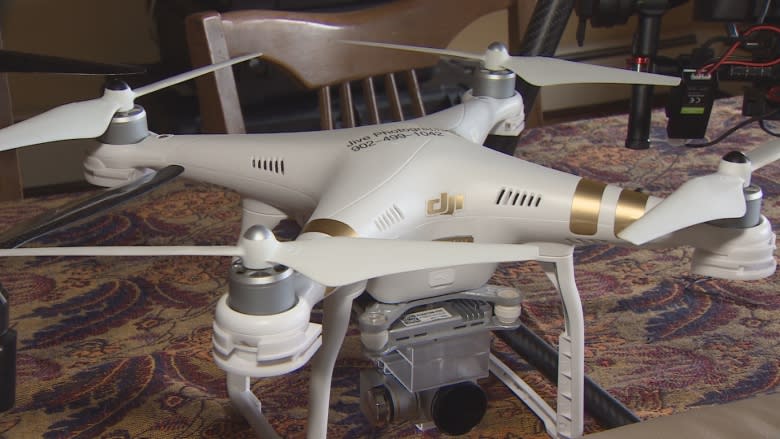Commercial drone users worry about ever-shrinking airspace
As Ottawa cracks down on recreational drone operators, those who fly the unmanned aircraft commercially are worried their airspace may be about to shrink as well.
"The government sort of reacted in a knee-jerk kind of way," said Darryl Duzak, an aerial cinematographer with Skyline Studio in Halifax.
In mid-March, Transport Canada announced new rules preventing recreational drone users from flying their machines within a nine-kilometre radius of all airports and helipads.
That puts all of peninsular Halifax off limits — not to mention much of Dartmouth and other outlying communities.
Rules 'tighten the stronghold'
"I think that if these regulations are in place for the recreational user, they're going to tighten the stronghold on us as well," said Duzak.
Duzak has three drones which he uses to record video of homes for realtors. He also shoots for commercials, film and television.
Before he puts one of his machines in the air, he calls the nearest airport for permission to fly — usually Shearwater. He files a Notice to Airmen, known as NOTAM, and lets the airport know where he's flying, when and at what altitude. He also alerts Nav Canada of his plans.
"You're an airman basically," he said. "You're a remote pilot."
He said not all drone operators are responsible and he understands why Ottawa wants to establish rules around safe use.
Increasing number of incidents
Transport Canada wouldn't argue with that. It said the number of reported incidents of drones "flying in a way that poses a threat to safety, security, or privacy" has more than tripled since 2014. There were 148 incidents in 2016 compared to 41 in 2014.
In the Atlantic region, Transport Canada said it investigated 15 reports of potential infractions involving unmanned air vehicles in 2014, 27 in 2015 and 26 in 2016.
Penalties include up to $25,000 in fines and/or jail time.
Who's enforcing new rules?
When he announced the interim order, Transport Minister Marc Garneau encouraged Canadians to call 911 if they saw a drone flying too close to people, animals or buildings.
David Fraser, a recreational drone user in Halifax, calls that an odd enforcement strategy.
"On one hand you think, 'Do the people taking 911 calls not have anything better to do than this?'" he said. "And also, do [the 911 operators] understand the regulation of aviation, which is a pretty complicated sort of area."
Making ground and air safer
RCMP said they'll work with Transport Canada to keep an eye on drones.
"Outside of the interim order, Canadian police can also lay Criminal Code charges such as public nuisance, criminal negligence, mischief, et cetera," said Cpl. Annie Delisle, a national spokesperson for the RCMP.
"The RCMP supports this initiative to keep both the skies and those on the ground safer."
Duzak said unless there's an obvious incident where someone is injured, it'll be difficult to police.
"That's the sad part of it," he said. "Someone's going to get made an example of. It's only a matter of time."



